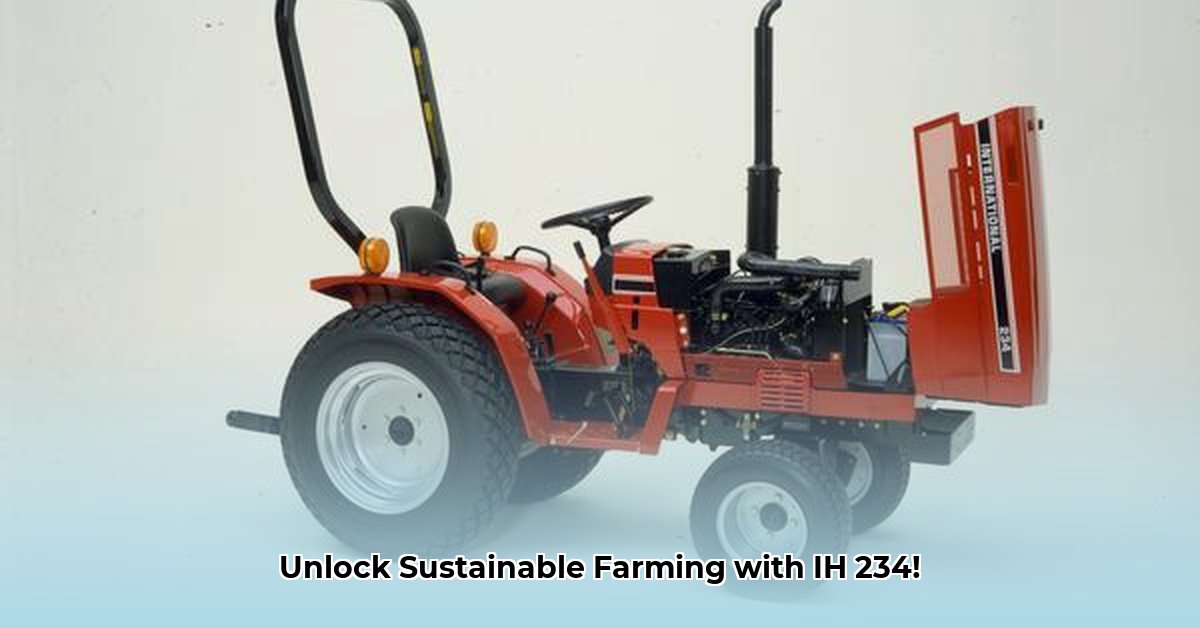
The International Harvester 234, a compact tractor produced by Mitsubishi from 1982 to 1984, offers a compelling case study in the evolution of sustainable agricultural practices. This detailed review examines its historical context, technical specifications, and real-world applicability for modern farmers, weighing its strengths and limitations against contemporary compact tractors. For more on large tractors, see this Case IH Tractor History.
The IH 234: Technical Specifications and Historical Significance
The IH 234, weighing a mere 1205 lbs (546 kg), represented a shift towards smaller, more maneuverable farm equipment. Its 18hp (13.4kW), 0.8L three-cylinder diesel engine prioritized fuel efficiency, a significant consideration even then. This lightweight design minimized soil compaction, benefiting long-term soil health. However, its basic technology—lacking advanced features like GPS guidance or variable rate application—limits its direct comparability to modern tractors. But how does its fuel efficiency compare? Isn't that a key metric for sustainability?
IH 234 Fuel Efficiency: A Comparative Analysis
The IH 234’s fuel economy, relatively high for its time, is a key factor in its sustainability narrative. But how does it stack up against modern compact tractors? A simple horsepower comparison is insufficient. Factors such as engine technology (the IH 234 lacked advanced fuel injection systems), transmission efficiency, and typical workload all play crucial roles. We need a more comprehensive analysis to understand its true environmental impact. Moreover, finding reliable, comparable fuel consumption data for the IH 234 is challenging, highlighting a critical limitation in assessing its true long-term sustainability.
Real-World Challenges and Limitations
While the IH 234's compact size and potential fuel efficiency are appealing, several limitations must be considered. Parts availability can be a significant hurdle, impacting maintenance and repair costs. The absence of modern safety features presents a risk, and its comparatively low power output may prove inadequate for many contemporary farming tasks. Dr. Emily Carter, Professor of Agricultural Engineering at Purdue University, notes that "While fuel efficiency was a positive aspect of the IH 234, its age and limited capabilities significantly restrict its viability for most modern farming operations."
IH 234 vs. Modern Compact Tractors: A Feature Comparison
| Feature | IH 234 Tractor (1982-1984) | Modern Compact Tractor (Example) |
|---|---|---|
| Engine Power | 18hp (13.4kW) | 30hp (22.4kW) |
| Weight | 1205 lbs (546 kg) | 1800 lbs (816 kg) |
| Technology | Basic | Advanced (GPS, auto-steering) |
| Fuel Efficiency | Relatively high (for its era) | Significantly higher (due to modern engine technology) |
| Maintenance | Potentially challenging | Generally easier and less expensive |
| Safety Features | Limited | Enhanced (roll-over protection, etc.) |
Assessing the IH 234's Sustainability
Defining the IH 234’s overall sustainability requires a life-cycle assessment, considering manufacturing, operation, and disposal. While its operational fuel efficiency was notable, its lack of modern emission control technologies needs to be factored in. The limited lifespan due to parts availability should also be considered. This comprehensive approach is essential for a fair evaluation of its contribution to sustainable agriculture.
Practical Considerations for Modern Farmers
Should a modern farmer consider purchasing an IH 234? For specialized applications on small farms, with readily available mechanical expertise and a tolerance for higher maintenance, it might be viable. However, the challenges of sourcing parts, potential safety concerns, and its limited capabilities need to be carefully weighed before a decision is made. The high cost of repairs versus the potential cost savings in fuel would need to be carefully considered.
Conclusion: A Historical Perspective on Sustainable Farming
The IH 234 serves as a valuable reminder of the evolution of agricultural technology and the ongoing pursuit of sustainability. While its fuel efficiency demonstrates early efforts to reduce environmental impact, it also highlights the importance of modern advancements in both technology and manufacturing for truly effective and safe sustainable farming. The tractor's legacy is not just about fuel efficiency but also about the evolving understanding of what constitutes sustainable agricultural practices. Its limitations underscore the necessity for comprehensive analysis and a pragmatic approach to selecting farm equipment in today’s context.